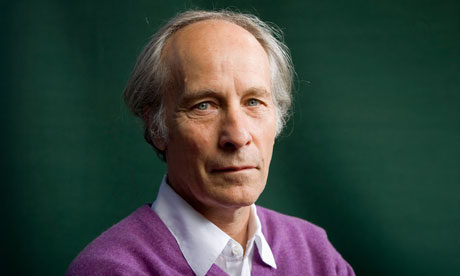Ford, Richard. Canada. Ecco/Harper Collins, New York, 2012 (420pp.$27.99)
For some of us the lunar loneliness of adolescence is truly the outer space of human life, clinging as we do to a cold blue moon that would just as soon let us drift away, ridding itself of our bad complexions, our vexing search for identity, and our complex inner silences. Adolescence is the subject of Richard Ford’s new and not entirely successful novel, “Canada,” which begins in the crime thriller fashion. “First, I’ll tell you about the robbery our parents committed. Then about the murders, which happened later.”
The adolescent in question is Dell Parsons, whose practical intelligence papers over every teenager’s hidden fears. Dell is given to long interior monologues that parse the behavior of adults he doesn’t comprehend. His father Bev is a former Air Force bombardier who has guided the family on its peripatetic way, moving to and from Air Force bases across the country, until everybody, including wife Neeva, a fraught, slight, Jewish woman entirely unsuited to life in Great Falls, Montana, comes to an uneasy repose in the frosty, highly polished northern light of the American West. Dell’s twin sister, Berner, an uneasy shadow on the X-ray of this wholly mismatched family, is as unlike Dell as she could be.
Ford places large significance on Ruskin’s dictum that “composition is the arrangement of unequal things.” When the family’s tiny fragile life is shattered by Bev’s unnaturally strange criminal behavior—first, engaging in the illegal sale of beef to an Air Force commissary, and then, when his miniscule criminal enterprise falls apart, resorting to the robbery of a bank in North Dakota to satisfy his partner’s threats and demands, Dells sees his tenuous hopes of high school, the chess team, and a quiet ascent into some kind of adulthood destroyed.
One of the central puzzlements of Ford’s book centers on verisimilitude. Dell’s father—a southern of voluble outlook, good for a joke and a platitude, stranded in civilian life as a salesman of sorts after being discharged from the Air Force, is hardly a perfect person. But why would he rob a bank, and why would Neeva join him in his hopeless. even ludicrous enterprise? Neither character seems adequately fleshed out for such an eventuality, which almost assuredly leads to ruin.
Then, after the parents are arrested, Dells is spirited by a family friend to the prairie near Fort Royal, Saskatchewan, where he is looked after by half-Cree Indian Charley Quarters, who works for the mysterious Arthur Remlinger. Remlinger, a character Ford tries hard to make real, remains a cartoon—part libertarian quack, a hotel owner, murderer, and political oddball, whose studious inadequacy for the role of a real person in a novel by a distinguished writer entails him remaining dead on the page. When Remlinger is pursued by detectives from Detroit (Remlinger planted a bomb as an act of right-wing political protest), he kills them and buries their bodies under the prairie sod. If these events seem contrived, they are. Dell never breathes a word about Remlinger’s crime. Hard to believe, harder to accept. Ford even thrown in a scene of incest to roil the plot.
In an earlier and better novel, “Wildlife”, Ford examines an adolescent boy (Joe Brinson) from Great Falls and what might be called the unquiet disquiet of family life. In the stories of “Rock Springs”, published shortly before, Ford also delves into life as it is lived in the New West. And while “Canada”, like these previous works, contains lovely set pieces and beautifully rendered passages of great passion, and while Ford assuredly re-creates the atmosphere of 1960, the book attenuates itself in its great brooding open spaces as Dell ruminates, calculates, observes and renders.
Dell’s mother kills herself in the penitentiary. His father disappears from the record. Berner flees into a life of alcohol and a series of failed relationships. And Dell himself, at age 60, must somehow reconstruct and make sense of what happened all those years ago in Great Falls. In effect, the novel’s power is dissipated by its length alone. What in Ford’s hands should have been a powerful short novel about the disintegration of a family became, somehow, the brooding effort of a great writer to create a masterpiece.


